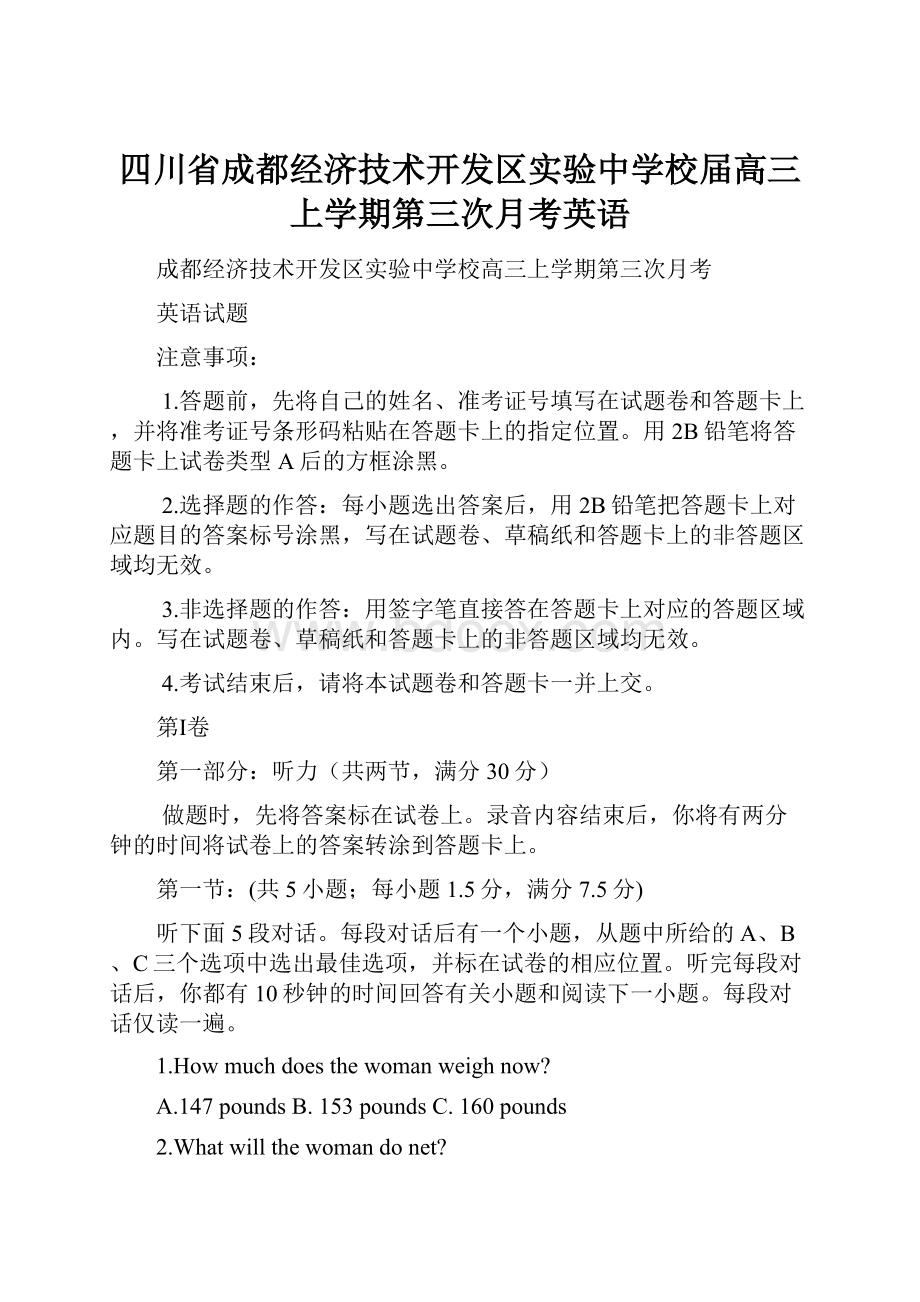四川省成都经济技术开发区实验中学校届高三上学期第三次月考英语.docx
《四川省成都经济技术开发区实验中学校届高三上学期第三次月考英语.docx》由会员分享,可在线阅读,更多相关《四川省成都经济技术开发区实验中学校届高三上学期第三次月考英语.docx(16页珍藏版)》请在冰豆网上搜索。

四川省成都经济技术开发区实验中学校届高三上学期第三次月考英语
成都经济技术开发区实验中学校高三上学期第三次月考
英语试题
注意事项:
1.答题前,先将自己的姓名、准考证号填写在试题卷和答题卡上,并将准考证号条形码粘贴在答题卡上的指定位置。
用2B铅笔将答题卡上试卷类型A后的方框涂黑。
2.选择题的作答:
每小题选出答案后,用2B铅笔把答题卡上对应题目的答案标号涂黑,写在试题卷、草稿纸和答题卡上的非答题区域均无效。
3.非选择题的作答:
用签字笔直接答在答题卡上对应的答题区域内。
写在试题卷、草稿纸和答题卡上的非答题区域均无效。
4.考试结束后,请将本试题卷和答题卡一并上交。
第Ⅰ卷
第一部分:
听力(共两节,满分30分)
做题时,先将答案标在试卷上。
录音内容结束后,你将有两分钟的时间将试卷上的答案转涂到答题卡上。
第一节:
(共5小题;每小题1.5分,满分7.5分)
听下面5段对话。
每段对话后有一个小题,从题中所给的A、B、C三个选项中选出最佳选项,并标在试卷的相应位置。
听完每段对话后,你都有10秒钟的时间回答有关小题和阅读下一小题。
每段对话仅读一遍。
1.Howmuchdoesthewomanweighnow?
A.147poundsB.153poundsC.160pounds
2.Whatwillthewomandonet?
A.DoshoppingB.GotoabanC.Visitapar
3.Whichtransportationdidthemantae?
A.ThebusB.ThetaiC.Theunderground
4.Wheredoestheconversationtaeplace?
A.Atastore.B.Atatailor’s.C.Athome.
5.Whatdoesthewomanthinoftheadvertisements?
A.FunnyB.MeaninglessC.Useless
第二节(共15小题;每小题1.5分,合计22.5分)
听下面5段对话或独白。
每段对话或独白后有几个小题,从题中所给的A、B、C三个选项中选出最佳选项,并标在试卷的相应位置。
听每段对话或独白前,你将有时间阅读各个小题,每小题5秒钟;听完后,各小题将给出5秒钟的作答时间。
每段对话或独白读两遍。
听第6段材料,回答6、7题。
6.HowdidthemannowaboutBossaNova?
A.Fromanewspaper.B.Fromthewoman.C.Fromhismother.
7.WhatdidthewomanliemostaboutBossaNova?
A.Thefood.B.Theatmosphere.C.Theservice.
听第7段材料,回答8、9题。
8.Whatistheman’sfavoritehobby?
A.Painting.B.Cycling.C.Goingtothenet.
9.Whydoesthewomanmaethephonecalltotheman?
A.Toshowhimaboo.
B.ToashisbrothertocallLyn.
C.Toinvitehisbrothertoseeacollection.
听第8段材料,回答10至12题。
10.Whydoesthewomantaltotheman?
A.Toseehisopiniononherpaper.
B.Togethisguidanceforherclasses.
C.Toasforinformationofadegree.
11.Whatdoesthemanthinisspecialaboutthemaster’sclasses?
A.Thestudentshavetohandinapaper.
B.Thestudentsshouldhaveahighlevelofanalysis.
C.Therearefewdiscussionsinthem.
12.Whatdoesthemansayaboutthewoman’spaper?
A.There’reafewmistaesinit.
B.Itisbadly-organied.
C.Itisperfect.
听第9段材料,回答13至16题。
13.Whatarethespeaerstalingabout?
A.Abuilding.B.Aflood.C.Ariver.
14.Wherearethespeaersnow?
A.Inthewoman’shouse.B.Inagarden.C.Inaschool.
15.Whatdidthewomandoatfirstwhenthewholethinghappened?
A.Sheleftherhouse.B.Shetriedtostopit.
C.Shemovedthefurnitureout.
16.Howdoesthewomanfeelnow?
A.Optimistic.B.Hopeless.C.Angry.
听第10段材料,回答17至20题。
17.Whatisthemainpurposeofthespeaer’swords?
A.Toreportonwor.
B.Togetmoresupport.
C.Togetrightsforthestate.
18.Accordingtothespeaer,onwhatshouldthegovernmentspendmoremoney?
A.Army.B.Personnel.C.Education.
19.Whatdoesthespeaerthinshouldbebannedfromdoing?
A.Sellinggunsinstores.
B.Raisingthecostofpolicecars.
C.Increasingthenumberofpoliceofficers.
20.Onwhatdoesthemanintendtoincreasethetaes?
A.Gas.B.Wine.C.Cigarettes.
第二部分阅读理解(共两节,满分40分)
第一节(共15小题;每小题2分,满分30分)
阅读下列短文,从每小题所给的四个选项(A、B、C和D)中,选出最佳选项,并在答题卡上将该项涂黑。
A
“Selfie”(自拍)joinsransofdictionarywords.
In2002,anAustralianmanwenttohisfriend’s21stbirthdayparty.Hegotdrun,trippedonsomestepsandcuthislip.Hetooapictureofhisinjuriesandshareditwithhisfriendsonanonlineforum.“Andsorryaboutthefocus,”hewrote,“itwasaselfie.”Thatwasthefirstrecordeduseoftheword“selfie”,accordingtolinguisticepertsatOfordDictionaries.
OnNov19,OfordDictionariesdeclared“selfie”WordoftheYearfor2013,inhonorofthetermhavingtaenovertheworldthanstomillionsofsmartphoneself-portraitsandtheresultingsharesonsocialmedia.
Sowhatdoesthechoiceofthewordsayaboutourculture?
MaryEliabethWilliams,writinginSalonmagaine,saysthewordremindsusthatcontemporarycultureisdefinedbyournarcissism(自恋).MeganJacsonfromalocalnewspaperpointsoutaselfiemayonlyfocusonappearance.
Selfiesinvitejudgmentbasedonappearancealone.Whatindofculturalinfluencedoesthishaveonwomen?
ErinGloriaRyanonJeebelsaysselfiesteachyoungwomantoobsessovertheirappearanceandjudgethemselvesonthebasisofbeautyratherthanaccomplishments.“They’reareflectionofthewarpedwayweteachgirlstoseethemselvesasdecorative,”saidRyan.
InSlatemagaine,RachelSimmonshastheoppositeview.Shearguesthatselfiesareaneampleofyoungwomenpromotingthemselvesandtaingcontroloftheirownself-presentation.Thinofeachone,shesays,as“atinypulseofgirlpride—ashout-outtotheself”.
21.Whichofthefollowingistrueaboutthefirstuseof“selfie”?
A.TheAustralianmancreatedittocelebratehisfriend’s21stbirthday.
B.TheAustralianmancreatedbychancewhenhegotdrunandsharedhisphotoonline.
C.TheOfordDictionaryusedittothanthecreationofsmartphone.
D.Thesocialmediaweresoadvancedthattheymadethewordtransmitted.
22.Theunderlinedword“tripped”inthefirstparagraphprobablymeans“________”.
A.traveled B.steppedlightly
C.felldown D.mademistaes
23.Whoholdsapositiveopiniontowardsselfieinthelifeofwomen?
A.MaryEliabeth. B.MeganJacson.
C.ErinGloriaRyan. D.RachelSimmons.
B
Ifawomanhasanetrapieceofcae,don’tblameitongreed,blameitonherbrain.
Scientistshavefoundthatwomen’sbrainsreacttofoodverydifferently--andmuchmorestrongly--thanmen’s.Academicsfoundthatdecadesofdietingpressureonwomenandadvertisinghaveprogrammedcertainpartsofthefemalebraintoreactstronglywhenfacedwithanyindoffood.Men,ontheotherhand,arenotusuallyasobsessiveaboutwhattheyeat.
Dr.RudolfUherandhiscolleaguesattheInstituteofPsychiatryining’sCollegeLondonusedbrainscanningtechnology,nownasfunctionalmagneticresonanceimaging(FMRI),tolooatthebrainsofeighteenmenandwomen.Thevolunteersweregivenimagesoffoodtolooat,aswellasfoodtotaste.Theirbrainreactionswereobservedbythescientists.Theyfoundthatthefemalebrainsreactedmuchmorestronglythanthoseofmales.Thesamereactiondidnothappenwhentheywereshownnon-foodimages.Theteambelievethismeanswomenthinmoreaboutfoodthanmentendto.
Dr.Uhersaid,“Thiscouldberelatedtobiologicaldifferencesbetweenmenandwomen.Butthemorelielyeplanationisthatwomenhaveamorecomplicatedreactiontofoodbecauseofsocialpressure.”
ProfessorCareyCooper,psychologyandhealthprofessoratLancasterUniversity,said,“forcenturieswomenhavehadaprovidingrole--preparingandcooingfoodfortheirfamilies.Andit'spartofthatroletomaesurethefoodissafe.Theywillthereforebemuchmoresensitivetofoodthanmenare,andIwouldnotbesurprisedifthatwasnowbuiltintotheirDNA.Ifthefemalebrainreactstofoodbecauseithistoricallyhasdevelopedneural(神经的)pathwaystodothis,thenfoodwillbethewaytheyepresstheirstress.Foodactually,isacomfortforwomen.”
Butotherepertshavesaidthatmoreresearchmustbedonebeforetheresultscanbeproved.AmericanscientistAngelodelParigioftheJohnB.PierceLaboratoryinNewHaven,Connecticut,said“LooingatanFMRIalonecannotmaesurewhetherthestrongerreactioninwomenisduetoinnate(天生的)differencesoralearnedprocess.”
24.Dr.Uherandhiscolleaguescarriedouttheresearchbycomparing.
A.Volunteers’reactionstofoodbeforeandaftermeals
B.FMRI’sscanningresultofscientists
C.women’sandmen’sbrainreactionstopicturesoffood
D.volunteers’imaginationonthetasteoffood
25.InDr.Uher’sopinion,womenreactmorestronglytofoodthanmenmostprobablybecausetheyare_________
A.borntodosoduetobiologicalreasons
B.influencedbyadvertisements
C.toldtodosoforalongtime
D.forcedbypowerfulsocialinfluences
26.AccordingtoProfessorCareyCooper,women.
A.aresatisfiedwithpreparingfoodfortheirfamilies
B.turntofoodwhentheyfeelsad
C.accepttheirsocialrolefromtheheart
D.arestressedbecauseoffoodsafety
27.WhatwasAngelodelParigi’sattitudetowardstheresearchresults?
A.CuriousB.Surprised.
C.Uninterested.D.Doubtful.
C
Newresearchshowsthatidsfromlow-incomefamiliesmaybefallingbehindtheirpeersbecauseanimportantpartoftheirbrainsisunderdeveloped.
ResearchersfromMIT’sMcGovernInstituteforBrainResearchcomparedthebrainsof12-and13-year-oldsfromrichfamilieswiththebrainsoftheirpeersfromlower-incomefamilies.Theyfoundthatoneparticularareaofthebrain—theneocorte(新皮质),whichplaysaeyroleinmemoryandlearningability—isthinnerinchildrenfromlower-incomehouseholds.
Thisisacrucialpartofthebrainforyoungstudents,whoareoftentestedbasedontheirabilitytorecalllargechunsofinformation.Childrenwhohadathinnerneocorteperformedpoorlyonstandardiedtests,researchersfound.Morethan90%ofhigh-incomestudentsscoredaboveaverageonastatewidemathandEnglish/LanguageArtsstandardiedtest,comparedwithlessthan60%oflow-incomestudents.Differencesincortical(脑皮层)thicnesscouldaccountforalmosthalfoftheincome-achievementgapinthissample,researcherswrote.
“Justasyouwouldepect,there’sarealcostnotlivinginasupportiveenvironment.Wecanseeitnotonlyintestscores,ineducationalattainment,butwithinthebrainsofthesechildren,”sayspsychologicalscientistJohnGabrieli,aprofessorofbrainandcognitivesciencesatMITandoneofthestudy’sauthors.
Sincea2011studypublishedbyStanfordUniversityprofessorSeanReardonfoundthatthegapbetweenstandardiedtestscoresofhigh-incomeandlow-incomestudentshasgrown